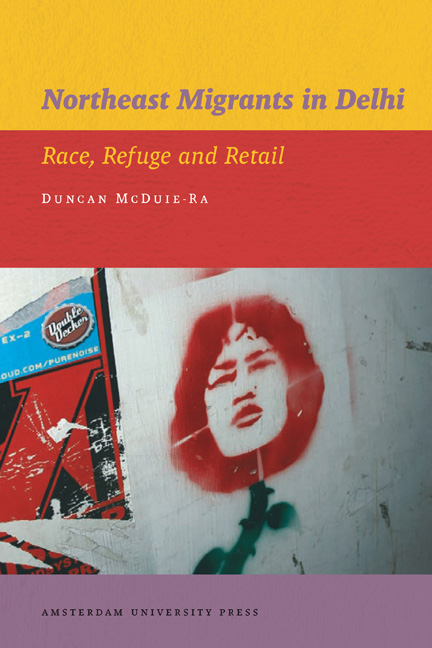Book contents
- Frontmatter
- Contents
- List of Maps and Images
- Acknowledgements
- Maps
- 1 Introduction
- 2 Leaving the Northeast
- 3 Coming to Delhi
- 4 Backward, Head-hunter, Sexy, Chinky
- 5 Provincial Men, Worldly Women
- 6 Place-making in the City
- 7 Conclusion
- Short Biographical Note on the Author
- Bibliography
- Index
- Publications Series
6 - Place-making in the City
Published online by Cambridge University Press: 14 January 2021
- Frontmatter
- Contents
- List of Maps and Images
- Acknowledgements
- Maps
- 1 Introduction
- 2 Leaving the Northeast
- 3 Coming to Delhi
- 4 Backward, Head-hunter, Sexy, Chinky
- 5 Provincial Men, Worldly Women
- 6 Place-making in the City
- 7 Conclusion
- Short Biographical Note on the Author
- Bibliography
- Index
- Publications Series
Summary
For Northeast migrants, life in Delhi can be extremely challenging. Discrimination, harassment, and violence combined with changing gender dynamics and difficult economic circumstances make life in Delhi tough. Nonetheless, Northeastern migrants get on with life in the city in ways that are mostly invisible to other communities. In this chapter I go beyond the notion of Northeast migrants as ‘victims of the city’ to focus on the ways they exercise agency to navigate, negotiate, and ultimately survive and even thrive in the city. The key question at the heart of this chapter is simple: how do Northeasterners get by in Delhi? I am concerned with the tactics, practices, politics, and objects that are imperative to Northeast life in Delhi. Bringing these together and arranging them into neat themes is difficult. The concept of place-making, drawn from Henri Lefebvre's dialectical approach (1991) to everyday life and the social production of space provides a loose framework for analysing the ways Northeastern migrants create place from the bottom-up in the context of attempts by governments and agents of capital to colonise space. Theorists of space and place, particularly in human and political geography, usually draw a distinction between the two, wherein space is rootless and shaped by external forces and place is rooted and shaped through human agency to produce and reproduce a social and moral meaning (Agnew 2011: 322). Often the struggle to create place out of space is a counter-hegemonic struggle, a concept particularly apt in the context of the reorganisation of urban space in India in a neoliberal era (Baviskar 2003; Bhan 2009). Yet clearly distinguishing between space and place can be empirically hazardous, and even the most localised place is usually affected by external influences of the space in which it is embedded (Merrifield 1993).
Here I adopt John Freidmann's use of place and place-making as an entry point to understanding Northeast life in Delhi. Freidmann defines places as ‘small spaces’ of a city. Place-making occurs when a material space is inhabited and allows patterns and rhythms of life to develop. Freidmann arrives at seven propositions for understanding place-making in China (2007: 172).
- Type
- Chapter
- Information
- Northeast Migrants in DelhiRace, Refuge and Retail, pp. 145 - 176Publisher: Amsterdam University PressPrint publication year: 2013



